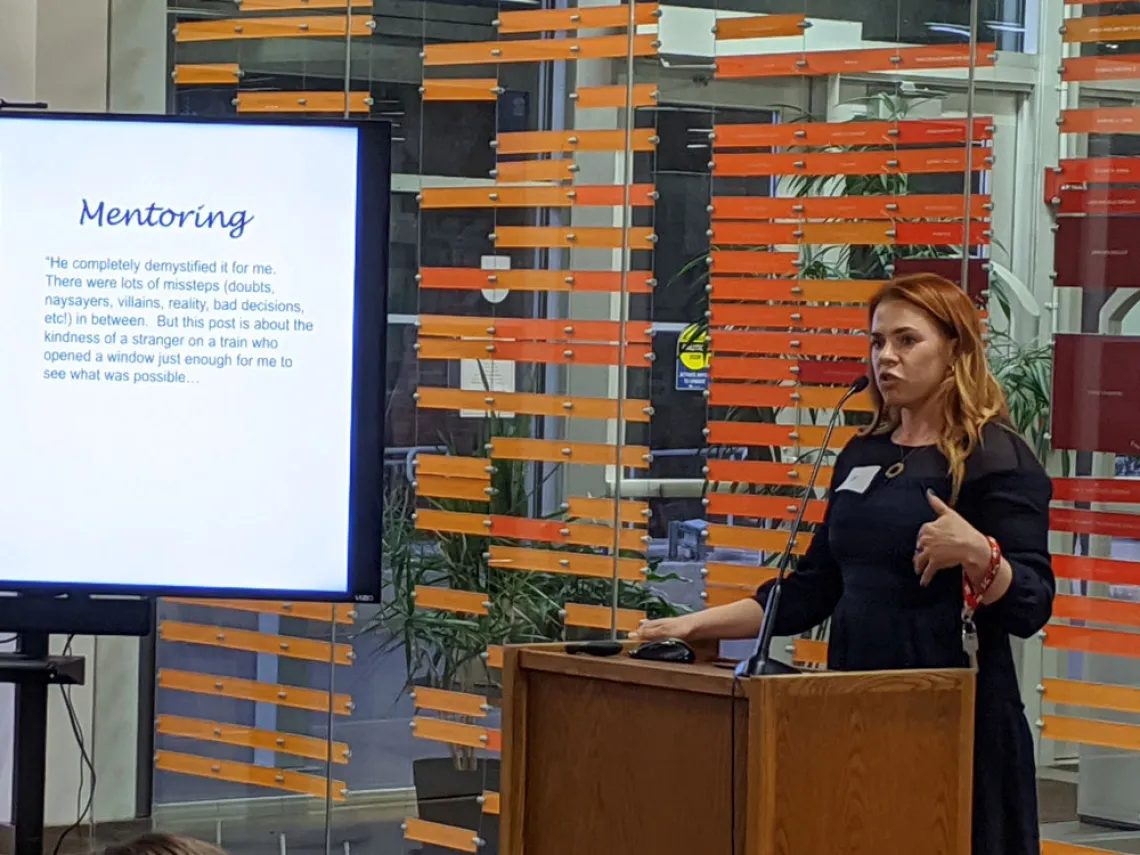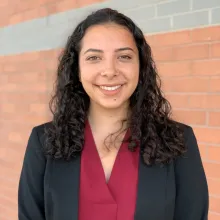Lawtina Mentoring Program Aims to Make the Dream of Law School More Accessible for Latinas

Jess Findley speaks at a reception celebrating the Lawtina Mentoring Program
Entering college, Stephanie Guereque didn't know a single person who worked in the legal profession. The first-generation college student majoring in Law and Spanish a the University of Arizona had her sights set on becoming an attorney, but without any professional connections, "My dream of going to law school seemed far away and maybe at times inaccessible," Guereque says.

Stephanie Guereque
So, in spring 2020, Guereque joined 18 of her peers in the inaugural cohort of University of Arizona Law's Lawtina Mentoring Program for Latina BA in Law students. And now?
"After taking this course and seeing how successful [our mentors] are, along with the other amazing women I met on the way, I am beyond excited for law school,” Guereque says. "I met some amazing people who work in this field."
Launched off the success of the BA in Law program, which offers rigorous training in core law subjects for undergraduates, Arizona Law introduced the Lawtina Mentoring Program to provide Latina BA in Law students with a more engaging educational experience through additional support and preparation for law school.
"Advising and mentoring are critical to success of students from underrepresented backgrounds in discipline-specific academics," says Jess Findley, director of the program and a research fellow at Arizona Law. "By using a mentorship network that includes peers, professional contacts, and shadowing, the program aims to help students develop professional identities and grow legal skills so they can successfully navigate the path to becoming a lawyer."
Students participate in the program as part of a one-unit course and receive individual mentoring and instruction on topics such as goal setting, free LSAT/GRE prep, financial and personal wellness, and admissions. The program also has a dedicated student advisor to help students navigate the path to law school. Mentors in the program come from diverse personal and professional backgrounds, and they get to know the students through weekly communication, shadowing and networking events.

Rya Nelson
“I am very glad I joined this course because it has given me a lot of insight into law school and what it is actually like to be an attorney,” says Rya Nelson, a spring ‘20 Lawtina participant who is now a first-year law student at the University of San Francisco School of Law. “Joining the Lawtina Mentoring Program was amazing for learning about law as a first-generation student, because I got to begin creating my network of attorneys. I also thoroughly enjoyed being in the program because it helped with relieving some of the stress I was having about law school applications.”
Nelson, both a first-generation college and law student, says that through speaking with her mentor in the Lawtina program, she learned about the importance of legal writing and got to practice legal job interviews before even going to law school, opportunities she didn't have access to on her own.
A Community Approach to Diversifying the Profession
The BA in Law program is well positioned to expand the pool of Latinas pursuing a legal career. Latinas make up about 25% of BA in Law students, compared to only 2% of U.S. lawyers. More broadly, approximately 55% of the BA in Law class is ethnically diverse, and more than 60% of the students are female.
As the legal profession seeks to diversify, initiatives like the Lawtina Mentoring Program aim to be a bridge to underrepresented student populations.
The program's first year was funded by the AccessLex Insititue and was created through on-campus and community collaborations. Latina lawyers responded to a survey about what would have helped them in pursuing a JD and participated in the program by speaking on panels. Members of Arizona Law’s faculty and administration provided course content. Counselors in the athletics department who were experienced with goal-setting and motivational interviewing created the mentor training program.
The Lawtina Mentoring Program aligns with the University of Arizona's broader efforts to support Hispanic students. In 2018, the University of Arizona became a Hispanic Serving Institution (HSI), a federal designation that acknowledges colleges and universities with 25% or more total undergraduate Hispanic full-time equivalent student enrollment. In 2019, Arizona was among nine higher education institutions to receive the inaugural Seal of Excelencia for demonstrating intentional impact and success in Latino student success.
Marla Franco, assistant vice provost for HSI Initiatives, provided the Lawtina Mentoring Program with guidance during its development stages.
“The Lawtina Mentoring Program is a great example of the investment and commitment that a college can make, in collaboration with Hispanic Serving Institution Initiatives, to truly serve students from diverse backgrounds,” Franco, says. “I witnessed firsthand how the students in this program felt affirmed, were given tools and resources to more closely examine their career interests, and were connected to an amazing group of diverse mentors who were practicing law in various capacities throughout the greater Tucson community. This was such an enriching experience for students!”
The Lawtina Mentoring Program will resume for its second year in spring 2021. For more information, contact Jess Findley.
